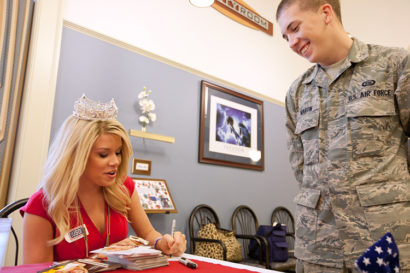
Teresa Scanlan started at Berkeley Law this fall. (UC Berkeley photo by Anne Brice)
First-year Berkeley Law student Teresa Scanlan never set out to be Miss America. It was just something that kind of happened.
From a family of six kids in rural Nebraska — all of whom were homeschooled — Teresa didn’t think about how she looked or what she wore. It wasn’t important. She cared about learning new things, playing piano and discussing politics with her family. She wanted to be a lawyer — somebody whose words people remembered.
“I was never the girl who wanted to be a princess when I grew up,” she says. “I never had any other plans except that I wanted to be an attorney, a judge, a Supreme Court Justice. In that order. That was my career plan all the way through.”
But Teresa knew she had to find a way to pay for college. So when she saw an ad in the local newspaper for a county fair pageant that gave the winner a $200 scholarship, she decided to go for it. And at 13 — wearing braces, a wide smile and a $12 dress from the after-prom sale at JC Penney’s — Teresa won her first pageant.
From then on, she started to enter more local pageants. She won some and lost some, but she always took home first place for her performance on the piano — a skill she was really proud of.

Teresa after she won her first pageant at 13. (Photo courtesy of Teresa Scanlan)
As a junior, she went to public high school and graduated early with honors. Her plans were in place — she would go to a university in Virginia, then to law school. She’d compete in pageants when she could to bring in more scholarship money, but it wouldn’t be a big deal — just something that she would do when she had time.
But at 17, she won Miss Nebraska and everything changed. She had one shot at competing in the Miss America Pageant.
“It’s truly once in a lifetime,” she says, “so I was kinda like, ‘Well, this is it.’”
Winning, as it turned out, wasn’t the hard part
For Teresa, actually competing in the Miss America contest in 2011 wasn’t the hard part. She went into the competition feeling good about who she was — she was 17, and hadn’t really experienced bullying or how mean people could be on social media.
“I went into it pretty naive,” she says. “I really wanted to prove myself and come across as mature and thoughtful and strong, and be able to hold my own with women who were much older than me,” she says. “I just wanted to make Nebraska proud.”
She didn’t think she had a chance at winning. After all, she was the youngest contestant — she made the age cut off by a week — and Nebraska had never won the title. It’s something everyone told her couldn’t happen.

Scanlan, the newly crowned Miss America, in 2011. (Photo courtesy of Teresa Scanlan)
But then she made the top 10. Then the top five.
“So I was standing there with my first runner-up and I just knew it was going to be her,” says Scanlan. “I was thinking, ‘She’s great. She’s 24 and awesome. Nebraska has never been a runner-up before and I’m going to go home and everyone will be so proud of me.’”
Then, they called her name. Teresa couldn’t believe it. And you can see it in the photos of her from the time — the look on her face is genuine disbelief. She was the youngest person to win the crown since Bette Cooper in 1937.
But the high didn’t last long.
The next day, she was flown to New York to do a weeklong media tour and from there, every day of her year — except three weeks of vacation — were planned out for her. She gave speeches to businesses, brought visibility to nonprofits, visited wounded veterans, sang the “Star Spangled Banner” at baseball games and gave face time at glitzy events like the Kentucky Derby.
It was really hard work, Teresa says.

During her year as Miss America, Scanlan spent a lot of time meeting military officers and visiting soldiers wounded in battle. It was a big reason that she joined the Air National Guard last summer. (Photo by Nate Pesce)
“You have no home base, no place to live,” she says. “It’s just you and two suitcases and your appearance manager. Everything is 100 percent controlled — what you wear, what you do. Every moment of every day. You’re writing your speeches, you’re doing your hair and makeup. I think it’s a lot more demanding than people realize. Your life is not your own.”
But that part didn’t actually bother her — she knew that’s what she was signing up for. And she thinks, because she was so young, she was kind of used to people telling her what to do.
It was when she saw the comments about her online that made her question everything she knew about herself.
All of a sudden, it was open season on her
Each time Scanlan would see comments about her online, she felt a piece of herself chip away. It wasn’t the comments criticizing her looks or body that got to her; it was when people attacked her intelligence. She knew she was smart, curious and hard working, but suddenly, no one else did.
“I remember watching a YouTube video of my piano piece and then just scrolling through the comments and starting to be like, ‘Wait, what?’ Just seeing thousands of comments ripping me apart for absolutely everything. There was always something about my blond hair. Always.”
Back home, people from her conservative Christian community said that wearing a bikini onstage was pornographic and that she wasn’t a true Christian. Others said she was demeaning herself and giving women a bad name.
“It became this overwhelming sense of, ‘You’re not pleasing anyone and you’re never enough for anyone. So what I considered a very strong sense of self quickly became an addiction to people pleasing — to doing what I thought would please the largest number of people.”
It’s a feeling that’s followed her throughout her life and in some ways, is still with her seven years later.
Speaking out
After her Miss America year, Scanlan didn’t slow down. She won a full scholarship to attend college in Virginia, got married, had a son, got divorced and, over the summer, joined the Air National Guard. She started at Berkeley Law this fall. And she’s only 25.

Last summer, Scanlan completed basic training for the Air National Guard. This was the first time she saw her 2-year-old son Jace in three months. (Photo courtesy of Teresa Scanlan)
Last month, she made headlines again when she gave an interview on Fox News in support of 2017 Miss America Cara Mund, who was calling for the organization’s board of directors to step down. As Miss America, Mund said she felt that she’d been bullied and silenced — especially by board Chairwoman Gretchen Carlson, who had been appointed to the position in January 2018.
After Mund went public with her criticism, Carlson held a conference call for all the former Miss Americas. Scanlan listened to her, asked questions and was ultimately dissatisfied with Carlson’s responses.
And Scanlan felt that it was her responsibility to join the 21 other former Miss Americas in publicly supporting Mund — something that she would have wanted when she had the title.
“I think Cara was really brave to come out and say what she did,” says Scanlan. “I think Carlson should have offered an apology right away. Instead, she tried to turn it around and say that what Cara was saying wasn’t true. If nothing else, it’s bad PR. I appreciate Gretchen as a person, but if she can’t do the right thing, she should step down.”
Carlson, who has been an active voice in the #MeToo movement, has spent the last year rebranding the Miss America Competition (it’s no longer a pageant) — most notably, by eliminating the bikini contest.
Scanlan says she doesn’t care one way or the other about the bikini competition, but she does want to be clear that she doesn’t think wearing a bikini detracts from a woman’s worth or intelligence.
“I think a very big part of being a feminist means allowing women to make choices for themselves,” she says. “We should be showing that you can do both. I really don’t think we hold men to the same standard. If a man does bodybuilding, we don’t consider that it takes away from anything else — that it makes him less intelligent or successful. I don’t want women to go through what I did.”
Back on track at Berkeley
As a law student at Berkeley, Scanlan is back on track with her life plan. She and her 2-year-old son, Jace, just moved to the Bay Area from her parents’ house in Nebraska and it’s been an adjustment figuring out how to balance schoolwork and life as a single mom. But she’s determined to make it happen.
She isn’t sure what kind of law she wants to practice — maybe corporate law or criminal law when Jace is older. But the next two years are open, she says — she’s going to let herself figure it out as she goes.
Some days are easier than others, she says, but she’s where she’s always wanted to be.
